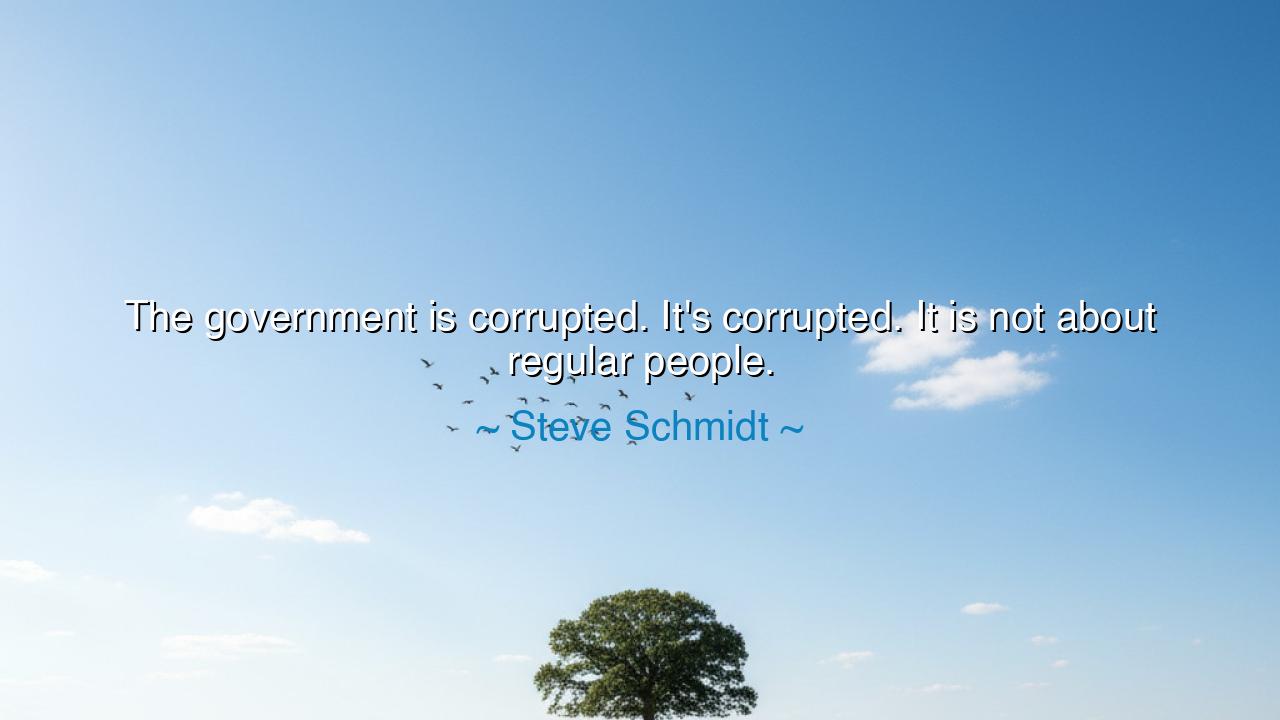
The government is corrupted. It's corrupted. It is not about






The words of Steve Schmidt strike like a thunderbolt through the fog of modern politics: “The government is corrupted. It’s corrupted. It is not about regular people.” This cry is not a mere complaint—it is a lament, an accusation, and a warning. In these words, we hear the grief of a citizen who has seen the machinery of power lose its soul. What was once a sacred covenant between leaders and the led has, in many corners, become a theater of deceit. The corruption of government is not merely the exchange of money or favor—it is the decay of purpose, the slow forgetting of whom the state exists to serve.
When a government ceases to be about regular people, it becomes an idol of itself. It begins to serve not the humble farmer or the teacher, not the mother or the worker, but the powerful, the connected, the self-interested. It grows distant from the heartbeat of its own nation. Bureaucrats replace servants; image replaces truth; and ambition replaces duty. In such times, men like Schmidt do not speak to sow despair—they speak to awaken the conscience of a sleeping people. For corruption does not begin in darkness; it begins in apathy, when citizens stop watching, stop questioning, stop believing that their voice matters.
Throughout history, the corruption of power has been a recurring plague upon humanity. Ancient Rome, once the model of civic virtue, fell into rot when its leaders traded public service for personal gain. Senators who once fought for the Republic began to fight for wealth, for spectacle, for the favor of emperors. The people, once the soul of the state, became spectators of their own decay. And so the Roman Republic, built on the dream of liberty and justice, crumbled into empire and tyranny. The lesson echoes across the centuries: when power forgets its moral limits, it devours the very people it was meant to protect.
A modern reflection of this tragedy can be seen in nations where money rules politics—where campaigns are bought, laws are written by lobbyists, and truth is twisted by those who can afford it. In such places, the common citizen feels invisible, their labor taken, their hopes dismissed. The voice of the people, once the foundation of democracy, is drowned beneath the roar of corporate interests and partisan rage. Schmidt’s words, born of his own years within the corridors of American power, carry the authority of one who has seen the rot from the inside. His declaration is not cynicism—it is a plea for redemption.
But corruption is not inevitable. History also teaches us that nations can rise again when the people reclaim their moral power. Consider the courage of reformers like Vaclav Havel, who faced down a decaying communist regime in Czechoslovakia with nothing but truth as his weapon. Havel declared that “living in truth” was the only antidote to the lies of the state. And he was right. When enough citizens refuse to be corrupted—when they demand honesty, transparency, and justice—the machinery of deceit begins to crumble. Even the most powerful institutions cannot stand against a people who rediscover their collective conscience.
Schmidt’s quote, therefore, is not merely an observation—it is a summons. It calls upon ordinary men and women to remember that the government is supposed to serve, not rule. It reminds us that democracy is not a spectator sport; it is a shared responsibility. If we allow the powerful to dominate unchecked, we become complicit in our own disenfranchisement. But if we engage, question, and hold leaders to account, then the corruption that seems invincible begins to lose its strength.
The lesson is clear: corruption thrives in silence. It withers when exposed to the light of truth and the courage of citizens. Each generation must renew the sacred bond between the governed and those who govern. Let every person remember that justice is not maintained by laws alone, but by hearts that refuse to be bought or broken.
And so, to those who listen to Schmidt’s words, take them not as despair but as duty. Stand watch over your government as the ancients once stood watch over their temples. Demand integrity. Speak truth even when it trembles. Vote with wisdom, not anger. Teach your children that power is a servant, not a god. For only when regular people reclaim their rightful place at the heart of governance will the word corruption become a relic of history, and the word freedom once again ring pure.






AAdministratorAdministrator
Welcome, honored guests. Please leave a comment, we will respond soon